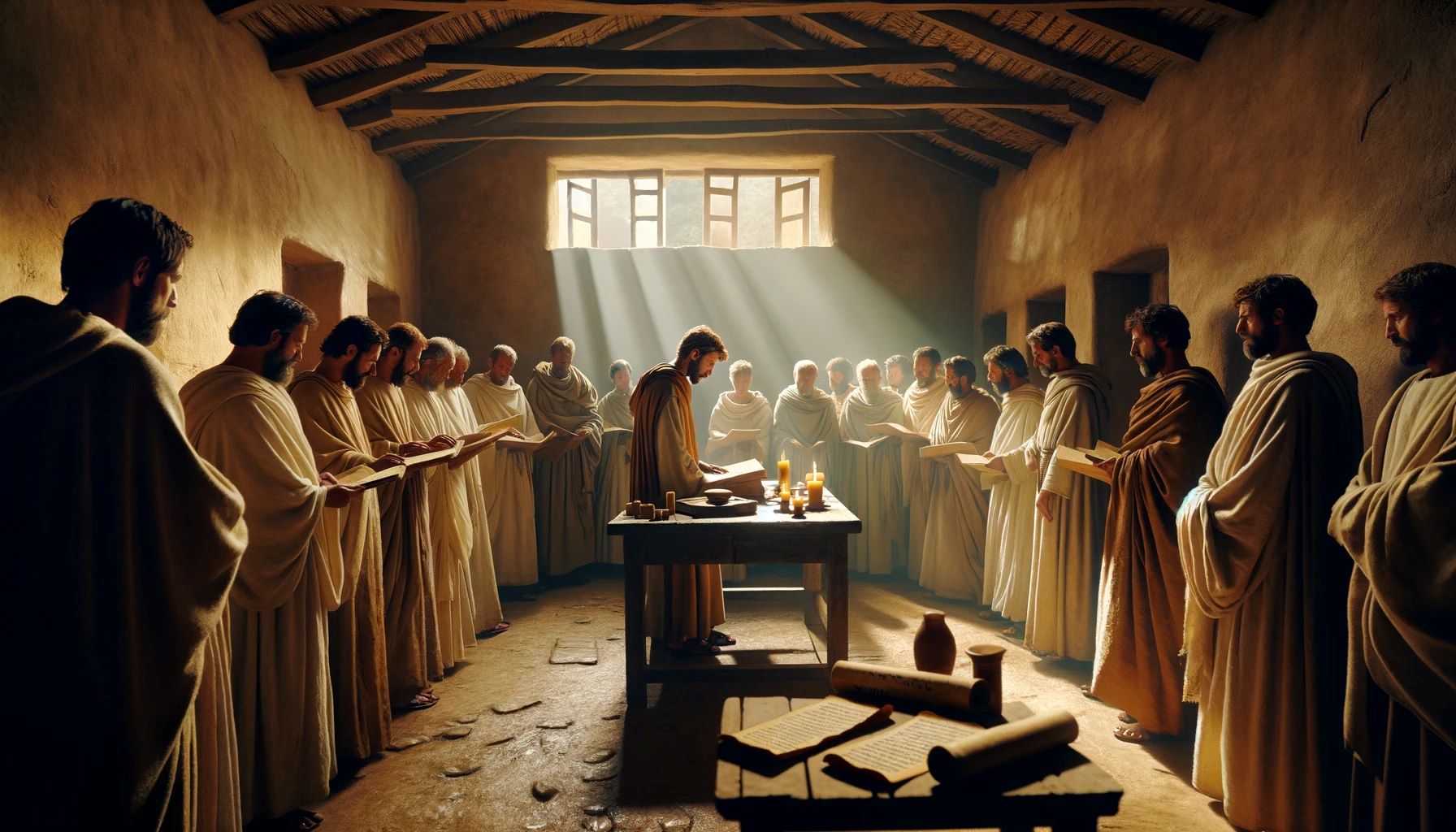Home>Bible Facts>What Is The Difference Of Apostles And Disciples


Bible Facts
What Is The Difference Of Apostles And Disciples
Published: February 22, 2024
Peter Smith, Editorial Director at Christian.net, combines deep insights into faith, politics, and culture to lead content creation that resonates widely. Awarded for his contributions to religious discourse, he previously headed a major organization for religious communicators, enhancing dialogue on faith's societal impacts.
Discover the key distinctions between apostles and disciples in the Bible. Uncover fascinating Bible facts about their roles and significance. Gain a deeper understanding of their contributions.
(Many of the links in this article redirect to a specific reviewed product. Your purchase of these products through affiliate links helps to generate commission for Christian.net, at no extra cost. Learn more)
Table of Contents
Introduction
The Bible is replete with individuals who played pivotal roles in spreading the teachings of Jesus Christ and establishing the early Christian church. Among these key figures, apostles and disciples stand out as central to the narrative of Christianity. Understanding the difference between apostles and disciples is essential for grasping the hierarchical structure and responsibilities within the early Christian community.
Throughout the New Testament, the terms "apostles" and "disciples" are frequently mentioned, often interchangeably, leading to confusion about their distinct roles and significance. While both groups were closely associated with Jesus during his ministry, they served different functions and held varying levels of authority within the Christian movement.
Delving into the nuances of apostleship and discipleship sheds light on the diverse contributions made by these individuals in shaping the foundation of Christianity. By examining their qualifications, responsibilities, and the nature of their relationship with Jesus, we can gain a deeper understanding of their respective roles in the spread of the Christian faith. This exploration will illuminate the unique attributes that set apostles and disciples apart, providing valuable insights into the early development of the Christian church and its enduring impact on the world.
Definition of Apostles and Disciples
Apostles and disciples are central figures in the New Testament, playing distinct roles in the ministry of Jesus Christ and the early Christian church. The term "apostle" originates from the Greek word "apostolos," meaning "one who is sent out." In the context of Christianity, apostles were individuals chosen by Jesus to bear witness to his teachings, spread the gospel, and establish Christian communities. They were entrusted with the authority to perform miracles and were instrumental in laying the foundation of the early church.
On the other hand, disciples, derived from the Latin word "discipulus," refers to "a learner" or "a follower." In the context of Jesus' ministry, disciples were individuals who followed and learned from Jesus, receiving his teachings and guidance. While the term "disciple" is often used to refer specifically to the twelve apostles chosen by Jesus, it can also encompass a broader group of followers who were committed to learning from and emulating the teachings of Jesus.
A key distinction between apostles and disciples lies in their roles and responsibilities. Apostles were designated as authoritative emissaries, empowered to preach, heal the sick, and perform miracles in the name of Jesus. Their mission extended beyond learning from Jesus to actively propagating his message and establishing Christian communities. In contrast, disciples primarily served as students and followers of Jesus, absorbing his teachings and embodying the principles of his ministry.
Furthermore, the designation of the twelve apostles holds particular significance in Christian tradition. These individuals, including Peter, James, John, and others, were chosen by Jesus for their unique roles in spreading the gospel and leading the early church. Their selection symbolized a distinct level of authority and responsibility, setting them apart from the broader group of disciples who followed Jesus during his earthly ministry.
In essence, while both apostles and disciples were intimately connected to Jesus and his teachings, apostleship carried a specific mandate of authority, leadership, and mission, whereas discipleship encompassed a broader category of followers and learners. Understanding the definitions of apostles and disciples provides a foundational framework for comprehending their respective roles and contributions to the early Christian movement.
Role and Responsibilities of Apostles
The role and responsibilities of apostles within the early Christian church were multifaceted and carried significant weight in shaping the foundation of the faith. Chosen directly by Jesus, apostles were entrusted with crucial tasks that contributed to the spread of the gospel and the establishment of Christian communities. Their authority and influence extended beyond that of the broader group of disciples, reflecting a distinct level of leadership and responsibility.
One of the primary responsibilities of apostles was to bear witness to the life, teachings, death, and resurrection of Jesus Christ. They served as authoritative messengers, proclaiming the gospel message to diverse audiences and regions. Through their firsthand experiences with Jesus, including witnessing his miracles and receiving his teachings, apostles were uniquely positioned to articulate the core tenets of the Christian faith and convey the transformative power of Jesus' ministry.
In addition to proclaiming the gospel, apostles were instrumental in establishing and nurturing Christian communities. They provided spiritual guidance, instruction, and pastoral care to believers, fostering the growth and consolidation of early Christian congregations. This involved teaching and exhorting new converts, resolving doctrinal disputes, and ensuring the spiritual well-being of the fledgling Christian assemblies.
Furthermore, apostles were endowed with the authority to perform miracles and acts of divine healing. This extraordinary power served as a tangible demonstration of the authenticity of their message and the divine endorsement of their mission. Miraculous interventions, such as healing the sick and casting out demons, not only validated the apostles' authority but also served as compelling evidence of the presence and power of God within the Christian community.
Another pivotal aspect of the apostolic role was the establishment of church leadership and governance. Apostles appointed elders, overseers, and deacons to provide structure and oversight within the growing Christian congregations. Their leadership extended beyond preaching and teaching to encompass the organizational and administrative aspects of church governance, ensuring the orderly functioning of the early Christian communities.
Moreover, apostles played a crucial role in defending the integrity of the Christian faith against false teachings and doctrinal deviations. They addressed theological controversies, refuted heresies, and safeguarded the purity of Christian doctrine, thereby preserving the authenticity and coherence of the gospel message.
In summary, the role and responsibilities of apostles encompassed proclaiming the gospel, nurturing Christian communities, performing miracles, establishing church leadership, and safeguarding the integrity of the Christian faith. Their unwavering commitment to these tasks laid the groundwork for the enduring impact of Christianity and the expansion of the early church.
Role and Responsibilities of Disciples
The disciples, often referred to as the twelve apostles, played a pivotal role in the ministry of Jesus Christ and the subsequent establishment of the early Christian church. Their responsibilities were closely intertwined with their roles as learners and followers of Jesus, as well as their contributions to the propagation of the gospel message and the nurturing of Christian communities.
At the core of their responsibilities, the disciples were tasked with closely following Jesus, learning from his teachings, and emulating his example. They were not only recipients of Jesus' profound wisdom and spiritual guidance but also embodied the principles of humility, servanthood, and sacrificial love that he exemplified. Their commitment to internalizing and living out the transformative message of Jesus was foundational to their role as disciples.
Furthermore, the disciples were actively involved in spreading the gospel message and ministering to others under the guidance of Jesus. They accompanied Jesus on his itinerant journeys, witnessing his miracles, and participating in the proclamation of the kingdom of God. Their firsthand experiences with Jesus equipped them to share his teachings and the message of salvation with others, thereby contributing to the expansion of the Christian faith.
In addition to their role as messengers of the gospel, the disciples were entrusted with the task of preparing the groundwork for the establishment of Christian communities. They engaged in teaching, exhortation, and the demonstration of God's power through acts of healing and deliverance. Their efforts were instrumental in laying the spiritual foundation for the early Christian congregations, nurturing the faith of believers, and fostering a sense of unity and fellowship among the growing community of followers.
Moreover, the disciples were called to embody servant leadership, mirroring the humility and selflessness demonstrated by Jesus. Their responsibilities extended to serving the needs of others, demonstrating compassion, and exemplifying the values of the kingdom of God. This servant-hearted approach not only reflected the essence of Jesus' teachings but also set a profound example for the early Christian communities to emulate.
In summary, the disciples' role and responsibilities encompassed learning from Jesus, sharing the gospel message, nurturing Christian communities, and embodying servant leadership. Their unwavering dedication to these tasks contributed significantly to the establishment and expansion of the early Christian church, leaving an indelible mark on the history of Christianity.
Qualifications and Selection Process for Apostles
The qualifications and selection process for apostles were integral to ensuring the credibility, authority, and spiritual preparedness of those chosen to fulfill this crucial role within the early Christian community. The process of identifying and appointing apostles was characterized by specific criteria and divine guidance, reflecting the significance of this leadership position in advancing the mission of Jesus Christ.
One of the primary qualifications for apostleship was a direct encounter with Jesus Christ during his earthly ministry. This firsthand experience allowed potential apostles to witness the teachings, miracles, and transformative power of Jesus, thereby establishing a profound personal connection with the Son of God. The intimate nature of this encounter served as a foundational requirement, ensuring that apostles were equipped with authentic and firsthand knowledge of Jesus' life, ministry, and resurrection.
Furthermore, candidates for apostleship were expected to demonstrate unwavering faith, commitment, and loyalty to Jesus. Their steadfast devotion and willingness to forsake personal ambitions and comforts in favor of wholeheartedly following Jesus were essential qualities that distinguished them as suitable candidates for apostolic ministry. Their readiness to embrace the sacrificial demands of discipleship and the mission of spreading the gospel exemplified their qualifications for assuming leadership roles within the early Christian church.
The selection process for apostles was characterized by divine guidance and discernment. Jesus, as the ultimate authority in appointing apostles, prayerfully and deliberately chose individuals whom he deemed suitable for this significant role. The process involved moments of prayer, reflection, and discernment, culminating in the selection of those who would carry forward the message of the kingdom of God and establish the foundations of the Christian faith.
The appointment of the twelve apostles, as recorded in the Gospels, exemplifies the meticulous selection process employed by Jesus. The deliberate choice of individuals such as Peter, James, John, and others was not arbitrary but rooted in divine wisdom and purpose. Their unique qualifications, including their personal encounters with Jesus, unwavering faith, and readiness to embrace the responsibilities of apostleship, positioned them as exemplary candidates for carrying out the mission entrusted to them.
In essence, the qualifications and selection process for apostles underscored the significance of authenticity, faithfulness, and divine discernment in identifying individuals who would serve as authoritative messengers and leaders within the early Christian church. The meticulous criteria and discerning process ensured that those appointed as apostles were not merely men of influence, but bearers of the divine mandate to proclaim the gospel and establish the kingdom of God on earth.
Qualifications and Selection Process for Disciples
The qualifications and selection process for disciples, particularly the twelve apostles chosen by Jesus, were pivotal in shaping the foundation of the early Christian community. The criteria for identifying and appointing disciples reflected the profound significance of their role in carrying forward the teachings of Jesus and establishing the nascent Christian church.
One of the primary qualifications for discipleship was a personal encounter with Jesus Christ during his earthly ministry. This direct interaction allowed potential disciples to witness the profound teachings, miracles, and transformative power of Jesus, fostering a deep and intimate connection with the Son of God. The firsthand experience of Jesus' ministry served as a foundational requirement, ensuring that disciples were equipped with authentic and firsthand knowledge of his life, teachings, and resurrection.
Furthermore, candidates for discipleship were expected to demonstrate unwavering faith, commitment, and a willingness to wholeheartedly follow Jesus. Their readiness to forsake personal ambitions and comforts in favor of embracing the demands of discipleship exemplified their qualifications for assuming leadership roles within the early Christian community. The disciples' steadfast devotion and sacrificial commitment to Jesus' mission were essential qualities that distinguished them as suitable candidates for carrying forward the message of the kingdom of God.
The selection process for disciples was characterized by divine guidance and discernment. Jesus, as the ultimate authority in appointing the twelve apostles, prayerfully and deliberately chose individuals whom he deemed suitable for this significant role. The process involved moments of prayer, reflection, and discernment, culminating in the selection of those who would carry forward the message of the kingdom of God and establish the foundations of the Christian faith.
The deliberate choice of individuals such as Peter, James, John, and others as the twelve apostles was rooted in divine wisdom and purpose. Their unique qualifications, including their personal encounters with Jesus, unwavering faith, and readiness to embrace the responsibilities of discipleship, positioned them as exemplary candidates for carrying out the mission entrusted to them.
In essence, the qualifications and selection process for disciples underscored the significance of authenticity, faithfulness, and divine discernment in identifying individuals who would serve as authoritative messengers and leaders within the early Christian community. The meticulous criteria and discerning process ensured that those appointed as disciples were not merely followers, but bearers of the divine mandate to proclaim the gospel and establish the kingdom of God on earth.
Relationship between Apostles and Disciples
The relationship between apostles and disciples within the context of the early Christian movement was characterized by a dynamic interplay of mentorship, leadership, and shared commitment to the teachings of Jesus Christ. While both groups were intimately connected to Jesus and played integral roles in advancing the gospel message, their interactions and responsibilities reflected distinct aspects of authority, discipleship, and collaborative ministry.
At its core, the relationship between apostles and disciples was rooted in the disciples' initial call to follow Jesus and learn from his teachings. The disciples, including the twelve apostles, served as direct recipients of Jesus' mentorship, witnessing his miracles, receiving his parables, and internalizing the profound truths of his ministry. This foundational period of learning and spiritual formation established a deep bond between Jesus and his disciples, laying the groundwork for their future roles as leaders and ambassadors of the Christian faith.
As the ministry of Jesus progressed, the disciples transitioned from being learners to becoming active participants in the proclamation of the gospel. Their close association with Jesus equipped them to share his teachings, minister to others, and prepare the groundwork for the establishment of Christian communities. This transformative journey from discipleship to apostleship exemplified the organic and collaborative nature of their relationship, marked by a shared commitment to advancing the kingdom of God.
Furthermore, the relationship between apostles and disciples was characterized by a symbiotic exchange of knowledge, spiritual authority, and mutual support. The apostles, endowed with authority and empowered to perform miracles, provided guidance, mentorship, and pastoral care to the broader community of disciples and believers. Their leadership and oversight contributed to the spiritual growth and consolidation of the early Christian congregations, fostering a sense of unity and purpose among the followers of Jesus.
Conversely, the disciples, drawing from their intimate experiences with Jesus and their firsthand encounters with his teachings, served as vital conduits for spreading the gospel message. Their role in sharing the transformative message of Jesus, nurturing Christian communities, and embodying servant leadership exemplified the collaborative nature of their relationship with the apostles. This reciprocal dynamic of mentorship, leadership, and shared mission underscored the interconnectedness of apostles and disciples in advancing the early Christian movement.
In summary, the relationship between apostles and disciples was characterized by a transformative journey from learning to leading, marked by a shared commitment to proclaiming the gospel and nurturing Christian communities. Their collaborative efforts, guided by the teachings of Jesus, laid the foundation for the enduring impact of Christianity and the establishment of the early Christian church.
Conclusion
In conclusion, the distinction between apostles and disciples within the context of the early Christian movement is essential for comprehending the diverse roles, responsibilities, and qualifications of these central figures. Apostles, chosen by Jesus and entrusted with authority, played pivotal roles in proclaiming the gospel, nurturing Christian communities, and establishing the foundations of the early church. Their qualifications and selection process reflected the meticulous criteria and divine discernment employed in identifying individuals who would serve as authoritative messengers and leaders within the Christian community.
On the other hand, disciples, particularly the twelve apostles, were characterized by their intimate learning experiences with Jesus, their role in sharing the gospel message, and their contributions to the establishment and nurturing of Christian communities. Their qualifications and selection process mirrored the profound significance of their role in carrying forward the teachings of Jesus and laying the groundwork for the nascent Christian church.
The relationship between apostles and disciples exemplified a dynamic interplay of mentorship, leadership, and shared commitment to the teachings of Jesus Christ. Their collaborative efforts, guided by the transformative message of Jesus, laid the foundation for the enduring impact of Christianity and the establishment of the early Christian church.
Understanding the unique attributes that set apostles and disciples apart provides valuable insights into the early development of the Christian church and its enduring impact on the world. The legacy of apostles and disciples continues to resonate within the fabric of Christianity, serving as a testament to their unwavering dedication, leadership, and pivotal contributions to the spread of the Christian faith.
In essence, the distinction between apostles and disciples illuminates the multifaceted nature of leadership, discipleship, and collaborative ministry within the early Christian movement, underscoring the profound impact of these individuals in shaping the course of Christian history and the enduring legacy of the Christian faith.














